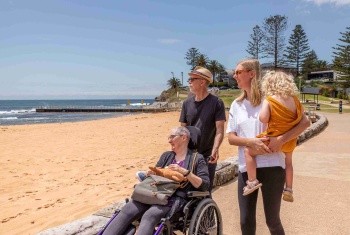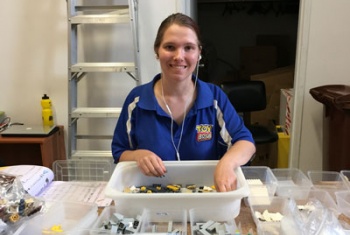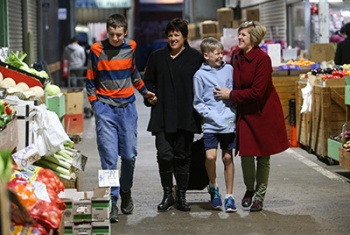Marilyn Dillon spent her daughter Tiana's childhood wondering what life would be like for her daughter as she grew up.
Tiana, now 21, was diagnosed with autism at the age of five.
“The doctors were pretty upset they didn’t pick it up until then, normally they try to pick it up earlier, so Tiana didn’t get therapy until later on,” Marilyn said.
Eventually, Tiana was able to access therapy to support her through her childhood, but Marilyn said Tiana had struggled throughout her childhood.
“We’ve had a lot of ups and downs, Tiana couldn’t talk or communicate, and we just couldn’t get in to her world.
“When she got older we had a bit of trouble because she retaliated a lot, she was trapped in this world that she couldn’t understand. We went through a lot of hard times.
“As time went on she got more therapy and we began to be communicate with her through sign language, visuals and drawings.”
As the years passed and with further therapy, Tiana began to use words and today is able to communicate with her mum without sign language.
“Sometimes I have to use visuals or if I say something too fast I need to slow down, but there’s not a lot of that these days.
“She has come a long way, sometimes she surprises me with the long words she says.”
That improvement has seen Tiana find a job, working two days a week at Comet Bay Primary School, something which she is able to maintain thanks to joining the National Disability Insurance Scheme (NDIS) two months ago.
The NDIS funds a support worker who takes Tiana to and from the school and is with her while she is at work, which has allowed her to now spend two days instead of one at the school.
“Before we joined the NDIS we were running out of funding for Tiana and I was getting very stressed,” Marilyn said.
“She had this great job and they were wonderful to give it to her and all of a sudden there was a chance she might not be able to continue.
“Since she joined the NDIS two months ago, Tiana is able to spend two days a week at work, and there’s a possibility she might get a job somewhere else too.”
Tiana also receives funding for therapies and for transport, and Marilyn said the NDIS support had made things easier for both of them.
“I can always get her support worker to come and pick her up and take her to activities, it’s very helpful that way.”
Tiana continues to make significant progress, with finding employment something Marilyn thought might never be possible.
“She has come a long way. She loves working with the kids because she can communicate with them, she’s at the same level.
“It’s been the best thing, she gets everything ready the night before and is up early ready to go, when I pick her up she’s in a happy mood.
“I must admit I had my doubts about what would happen as she grew up, but she’s done so well and we’ve seen so much improvement.
“She’s a happy child doing what she’s doing now, all I hope is that she gets better and better and she keeps improving.”
International Day of People with Disability is held on 3 December every year. It aims to increase public awareness, understanding and acceptance of people with disability and celebrate their achievements and contributions.
The NDIS provides Australians under the age of 65 with a permanent and significant disability the supports they need to live an ordinary life and to increase their social and economic participation. The NDIS is now providing support to more than 200,000 Australians.


